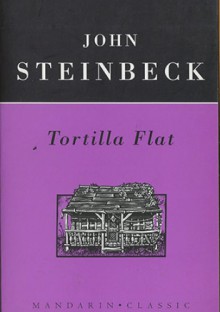
Tortilla Flat
'THIS is the story of Danny and of Danny's friends and of Danny's house. It is a story of how these three became one thing... so that in Tortilla Flat if you speak of Danny's house you do not mean a structure of wood flaked with old whitewash, overgrown with an ancient untrimmed rose of Castile.'...
show more
'THIS is the story of Danny and of Danny's friends and of Danny's house. It is a story of how these three became one thing... so that in Tortilla Flat if you speak of Danny's house you do not mean a structure of wood flaked with old whitewash, overgrown with an ancient untrimmed rose of Castile.'
Steinbeck's first major critical and commercial success, "Tortilla Flat" is also his funniest novel. In it we meet Danny, who inherits no less than two old houses in the seedy end of Monterey. Here he holds court for his paisano friends from the valleys, woods and beaches nearby.
Through a series of great adventures and daring deeds, they form a tight-knit group with a code of honour and a clear purpose in life. Until a stranger, the Pirate, arrives to tempt them...
źródło opisu: Mandarin, 1995
źródło okładki: zdjęcie autorskie
show less
Format: papier
ISBN:
0749317795
Publish date: 1995 (data przybliżona)
Publisher: Mandarin
Pages no: 178
Edition language: English

At least I can thank this book's financial success for inspiring the exceptional sequel "Cannery Row", many years later. I'd like to say that I saw Steinbeck's explicit reliance on tales from King Arthur. Maybe I got very close, noticing the parallel between a quest in the forest and scenes from a f...

Tortilla Flat tells a strange rendition of King Arthur's tales. Three "paisanos," as they are called--Pirate, Jesus Maria, Pablo, Pilon-- are drawn to Danny's house and find home as his friend. I admit, I waited around for several chapters, hoping to see more of the Arthurian legend peek through in ...

Tales of the tall variety about a silly gang of friends whose boy's club antics remind one at times of "The Three Stooges" or "Last of the Summer Wine" as they cast about in search of adventure and drink, spinning their own unbelievable yarns while getting drunk, and philosophizing with wild abandon...

Although it was initially rejected for publication on a number of occasions, this work – a short story cycle - was Steinbeck’s first real critical and commercial success,. He wrote it during 1933 and early 1934, when he was heavily involved in caring for his elderly parents, who were both were very ...

Not my favorite Steinbeck so far, but I did like it. Funny and largely episodic. I struggled with the pacing because there were no hooks--no over arching mystery to pull me along. I struggled to differentiate between many of the characters because they were similar with common traits, namely they we...

